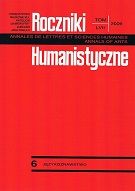Łaciński leksem sane jako tzw. wyrażenie funkcyjne
The Latin Lexem sane as the So-Called Functional Expression
Author(s): Małgorzata GórskaSubject(s): Language and Literature Studies
Published by: Towarzystwo Naukowe KUL & Katolicki Uniwersytet Lubelski Jana Pawła II
Keywords: functional expression; parts of speech; grammatical classes of lexems; uninflected lexems; adverbs; particles; additions; wyrażenia funkcyjne; części mowy; klasy gramatyczne leksemów; leksemy nieodmienne; przysłówki; partykuły; dopowiedzenia
Summary/Abstract: The Latin lexem sane is derived from the adjective sanus (healthy, sane, sensible). Beyond the “proper” adverbial usage, i.e. in its extratextual function (that refers to the sphere of the nonlinguistic phenomena), it very often plays also intratextual functions (it does not refer to the nonlinguistic reality), but serves to “comment” on linguistic objects). In other words, it belongs to the so-called functional expressions. Assuming one of the classification of uninflected lexems (by M. Grochowski) as the starting point one may state that sane belongs to three different functional classes (parts of speech), for it occurs as (1) adverb (healthy, sanely, sensibly), as (2) a particle: a) operator of gradation (totally, entirely, very), b) epistemic particle (with certainty, without doubt) – pragmatically also as an expression of irony, c) particle at the imperative (“enhancement” of the imperative or exponent of permission), d) particle in concessive sentences (exponent of permission), and as (3) addition (yes, of course, very well, certainly). The last two classes of lexems, that is particles and additions, belong to functional expressions. The initial proposal to order the description of the function of only one Latin lexem (polysemic or, perhaps, several homonymic lexems), traditionally included to adverbs, seeks to turn our attention to the need for a new consideration of uninflected lexems in Latin.
Journal: Roczniki Humanistyczne
- Issue Year: 57/2009
- Issue No: 06
- Page Range: 11-27
- Page Count: 17
- Language: Polish

